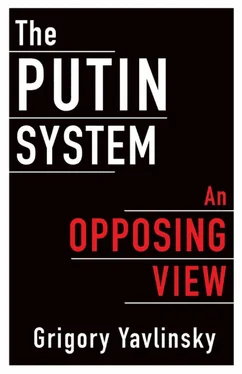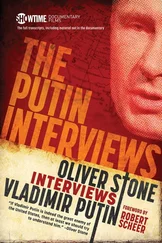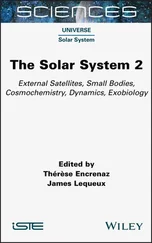Furthermore, the Russian authorities have learned to turn attempted outside pressure to their benefit in domestic propaganda. For example, the United Kingdom’s accusation that Russian authorities were behind the poisoning of former Russian agent Sergei Skripal and his daughter was used to stir up support for Putin on the eve of the March 2018 elections.
At the same time, foreign powers have abandoned the idea of attempting to influence Putin’s domestic policy and have left it completely to Putin’s discretion. Western actions, which are viewed by Russia’s government as hostile, are designed either to prevent the Kremlin from using external resources and opportunities to its own ends or to prevent it from making particular steps in its foreign policy, while domestic policy has come to be regarded by the West as the Kremlin’s exclusive prerogative.
On the whole, the Putin system has acquired the features of a mature autocracy organized on the principles of Mafia-like syndicates, with personal rule, a sophisticated ideological underpinning, and steady support from below, while external threats to it have been reduced to a minimal level.
The results of the March 18, 2018, plebiscite opened the way for Putin’s lifelong rule. In fact, that was its main purpose, determined by the ruling circle. The technical details of implementing this task, including possible changes to relevant clauses of the constitution, evidently will be decided upon later, depending on the balance of different powers and groups within the Kremlin. It makes little sense to attempt to guess which scenario will finally be chosen—though, in any of them, the resources of the system will sooner or later be exhausted, if only because of the physical limits of human life.
But Putin’s system cannot last forever for a bigger reason: its built-in deficiencies will prevent it from maintaining continuous control over political and business life. Even before its lower links fly out of control, members of the ruling circle will become aware of the looming crisis and the need for change. Inevitably, that will require either a deep review of the system (which would be the minimum change needed) or a reform of political life on completely different principles, which would also invite radical changes in business life.
However, before that happens, the system will have to travel the entire road from supposed triumph to actual collapse. And Russia will have to travel the path along with the system, no matter how distressing that may be. Moreover, the question of what system would replace the current one remains open. If it is a hybrid version of the Soviet system or a techno-military dictatorship, Russia’s prospects will be dim indeed.
To prevent that outcome requires a lot of hard work. By the time Russia approaches the next fork in the road, there must be well-educated and politically acute people ready to use the moment of truth to reinstate necessary political institutions. That’s why I thought it necessary and important to take the opportunity to talk to the nation as a presidential candidate in the recent campaign. We must work for the future by cultivating the soil for a forthcoming new politics in Russia.
Page numbers refer to the print edition but are hyperlinked to the appropriate location in the e-book.
accountability: as basic function of adequate government, 108; feared influence of Western views on, 211n7; introduction of, as necessary reform, 18; lack of, in authoritarian governments, 26; lack of, in Russian government, 81, 92, 133, 164, 173, 202; necessity of working institutions for, 41
Acemoglu, Daron, 26, 82
Aumann, Robert, 26
authoritarian system(s): adaptable vs. stagnation-prone forms of, 54–55; bureaucrats’ diversity of ideology in, 87–88; control of elections in, 76–77; control over private individuals, 36; extraction of rents in, 81–83; factors contributing to potential collapse of, 144–45; fear of immanent revolution as only constraint on, 82, 210n3; function of political parties in, 77; higher rate of failures of governance, 29; ideology, typical lack of, 85, 86–88, 160–61; as inevitable losers in global economic competition, 184–85; institutions in, 124–26, 129–30, 176; lack of checks and balances in, 81; as stage in all countries’ development, 114–15; theories on reasons for emergence of, 23; toleration of some public debate on issues, 87; transfer of power in, 21–22; varying central goals of, 80. See also peripheral authoritarianism
authoritarian system(s), Russia as, 66; and peripheral economic status, xi. See also peripheral authoritarianism of Russia
authoritarian systems’ transition to competition-based systems: cases of, 29–30; changing views on inevitability of, 140–41; factors likely to delay, 142–44
authoritarian systems vs. competition-based systems: advantages of competition-based system in complex society, 141–42; borderline cases, 24; dynamic or static system as separate issue from, 28–29; as key distinction, 21; public good as separate issue from, 24–26; relative adaptability of, 55; relative number of, 23, 36; rulers’ interest in modernization as separate issue from, 26–27
autocracy: instability of, 129–30; lack of functioning institutions in, 125–26; social base of, in near vs. distant economic periphery, 115–16; as stage in all countries’ development, 114. See also peripheral authoritarianism
autocracy in Russia: as Eurasianist form, 91–92; hardening of, 197; as mafia-life, 203; patronage and, 195; and presidential debates, 92; strengthening of, 135–36, 173, 202. See also future of Russian autocracy; peripheral authoritarianism of Russia
Baltic states, success of competition-based government in, 44
Belarus, European development path as only available option for, 155
Berezovsky, Boris, 34
Bowling Alone (Putnam), xiii
Brezhnev, Leonid, 185
Brzezinski, Zbigniew, 140
bureaucracy: role in countries of near vs. distant periphery, 115–16; in Russia, and social support of government, 118–19, 121–22
cash flows in Russia: and corruption, 104; government control of, xvii, 104, 133–34, 194–95; government control of, as substitute for ideology, 90; government cutoff of political resources to other groups, 66, 67–71, 194–95; as substitute for ideology, 90. See also natural resources in Russia, export of
castling of 2008, 63, 145
Chechnya war (1994), negative effects of, 37–38
checks and balances: as antithetical to traditional Russian view of legitimate power, 48–49; lack of, in authoritarian systems, 81; as only way to assure effective government, 82; Russian drift toward totalitarianism and, 197–98, 199; theory of human nature underlying, 81–82
China: as peripheral authoritarian state, 114; as Russian competitor, 94, 95; successful modernization in, 25
Chubais, Anatoly, 34
civilizations, multiple, theory of, 138–39
civil rights, as issue in 1990s, 43
civil society institutions, Western, weakening of, xiii–xiv
competition-based systems: advantage in global economic competition, 185; attitudes of elites needed for transition to, 177–78; cases of decay into authoritarian regimes, 30; consensus on basic principles required for, 43–44; and democracy as ideology, 86; as “democratic” in loose sense of term, 22–23; difficulty of transition from peripheral authoritarianism to, 175–77; as final state of history, recent doubts about, 137–41; ideological party differences in, 85, 86; institutions required for, 41–42, 125; introduction of, as necessary Russian reform, 18; reversibility of transition to, 114–15; safeguards to preserve multiple centers of power, 22, 23; theories on reasons for emergence of, 23; totemic status of, as result of power of Western countries, 36; transfer of power in, 21–22. See also democratic system(s)
Читать дальше












